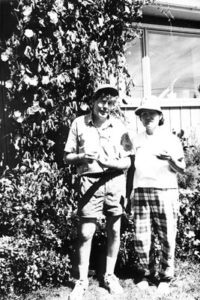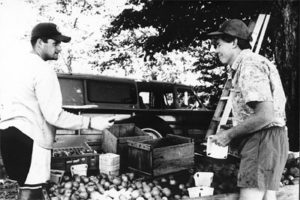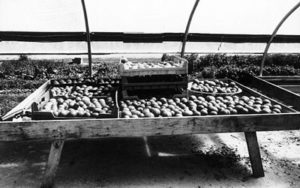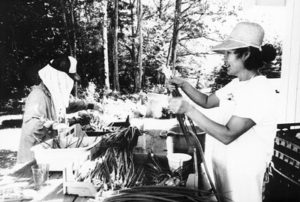 |
| Ben and Song with a spectacular morning glory in front of their home. All photos by Jane Lamb. |
By Jane Lamb
Faithful patrons of the Camden Farmers’ Market were disappointed to learn in May that Ben Wilcox and his partner, Song Emery, would no longer be there purveying fresh organic produce from Part ‘n Parcel Farm. “Last fall and summer we enjoyed the best growing season in memory,” Ben said recently, attributing the bounty to the extended season and its unusual warmth. “As the last markets rolled to a close, I couldn’t find a positive note on which to reveal that we didn’t plan on returning the following spring. I felt I was doing a kindness to the customers, allowing them to drift through the holidays and winter months dreaming of a fresh market season.” Their millennium opening day was a shock, he said, when they learned not only that Part ‘n Parcel would not be there, but that other vendors had known about it since he’d turned over the treasurer’s books last fall.
Reflecting on the Camden market’s 25th anniversary celebration last Labor Day, a particularly poignant time for Ben and Song, he continued, “Just as many people have participated in MOFGA’s creation and operation over the last quarter of the 20th century, so have many people worked to enliven the Camden Farmer’s Market.” Ben joined the enterprise 14 years ago, when Gus Brill of Rockport kept writing to him, desperately seeking new vendors to replace those who had left. From that low point, the market grew steadily, Ben said. “Six other vendors and [I] began a Wednesday afternoon market and endured two painfully slow years before it caught the imagination of Camden shoppers and we had to limit the [number of] vendors who wanted to join.” Now Ben tempers his regrets with the knowledge that there has always been a steady stream of farmers flowing through the market, working hard to bring fresh produce to the public. He’ll continue to encourage a new generation of farmers to join and he’ll be sharing some of his hard-earned know-how with them.
The Sorcerer’s Apprentice
After more than 20 years of learning “how to succeed at market farming without really trying,” Ben was beginning to feel like the Sorcerer’s Apprentice. “We found easier ways to grow vegetables, consequently we grew more and more vegetables,” he said last September. Eventually their priorities got subverted by the demands of business. “We felt like prisoners in Vacationland, like kitchen help to the people coming here [for leisure].” At their home in Dixmont, on one more of those perfect late summer days of 1999, Ben and his helper, Josh Silva, were sorting and packing boxes of spotless tan and rosy potatoes under the big maples behind the house. Sharing the shade, Song and her friend, Su Havey, both natives of Korea, washed and trimmed bunches of gleaming scallions. “I think we find all tlhat] is easy, what to do nice[ly], then maybe time to retire,” said Song, her small smile and the quiet humor of her tone a fine foil for Ben’s high energy and effervescent wit. “It would be if we had a solution,” Ben rejoined then, though they had already made the decision. “One solution would be just to stop.” Not as easy as it sounded, he pointed out. All their market production took place on 4 acres of rented fields 5 miles away. He didn’t like to think about those fertile fields perhaps being lost from cultivation. There was equipment to be disposed of as well. Nevertheless, they went ahead with their plan.
 |
| John Silva and Ben Wilcox pack potatoes for the farmers’ market. |
But Ben couldn’t give up farming. This spring, he and Song had a greenhouse full of seedlings for sale and a small garden on a quarter of an acre behind their house to supply themselves, a few caterers and maybe the Belfast and lincolnville coops – a far cry from the truckloads they used to take twice a week to the Camden Farmers Market. “This is a sort of experiment to see how much we can grow here, and we will continue growing here,” Ben said. Earlier this year he worked temporarily at Johnny’s Selected Seeds in Albion. “I’m thinking of having a day job with farming as a sideline. I still have a mysterious new occupation – none!” he quipped with his familiar wry chuckle last May – Except perhaps to serve as a MOFGA tribal elder. “From 20 years in growing,” he wrote for this article, “I have gleaned the following observations:
1. To identify all the potential profits and pitfalls, it’s important to carry through a chosen enterprise for a complete season, even if at a vary small scale.
2. We found it more profitable to make our mistakes as we could afford them, rather than borrowing a lot of money to make them all at once.
3. We evolved a planting schedule which allowed for a continuous harvest of a variety of crops, to enhance the market presentation.
4. We ignored the supermarket price, concentrating on what customers were willing to pay for the premiums of freshness, flavor and quality.
 |
| Tomatoes ripen in the greenhouse. |
5. Varieties which yield well and suit local customer preferences are always worth seeking and boost profitability at no additional production expense.
6. The amount of each vegetable to grow will never be found in a book. Demand varies during the season and is determined by the market you are able to secure.
7. Pacing for the marathon of a long, hot summer is critically important. Do what needs doing most, quit when you’re tired and recognize that there will always be more than can be done.
8. And from Eliot Coleman, the keystone to financial sanity: ‘Make a little money, spend a little less.’ “
Simplify, Simplify
Such are Ben Wilcox’s pearls of wisdom today. The first time I wrote about Ben, (The MOF&G, November/December, 1983) he was running up and down among 32 quarter-acre vegetable plots, clipboard and checklist in hand, recording the type and amount of nutrients applied to each plot according to color-coded soil maps, only part of the welter of , paper work that filled his life along with the endless farm chores. Ben and his partners started summer mornings planning work schedules for a dozen crew members and packing lists for four or five markets a week. Frenzy was the operative word. “We try to be as disorganized as possible and still be successful,” he said back then. Now, through years of experience, creative thinking and change, the frenzy has been replaced by a sense of well-oiled harmony, even though he and Song, who started farming with him at Part ‘n Parcel Farm in 1994, have been working as hard as ever. With only two extra helpers, they were raising on 4 acres at least as much as in the past. What’s the secret? Simplify, said Ben. Efficiency may yield greater production, but not necessarily less work. “It’s really just the same thing as asking Cindy Blodgett how does she play so well,” Ben explained. “She comes in two hours before the game to shoot baskets. She’s always in the gym, just obsessed with basketball. Never take your eye off the ball. We’re always out there planting, weeding, cultivating. Unfortunately, it’s overwhelming.” “Retirement” was definitely in order.
 |
| Song (right) and Su (left, wearing a scarf for sun protection) clean and pack scallions. |
Now at Part ‘n Parcel Farm, downsized for the new millennium, Ben and Song are sticking to “The Golden Rules of Gardening,” prominently displayed on a blackboard as a constant reminder to themselves and anyone seeking advice.
• Plant small areas
• Plant often – every 10 to 14 days – for continuing harvest
• Plant variety to spread the work load and extend the market through the summer
• Use season extenders to speed up plant growth
• Weed early and often
• Coordinate row width with cultivating equipment
• Don’t go into the garden without a basket. Something is bound to be ripe
“That last one is the best one. Otherwise, you end up with your shoes and your hat full,” Ben said. “So I tried to simplify everything, and this is it, the sum of my 25 years of experience.” Ben now keeps track of dates and amounts by internalizing most of the data. Instead of a clipboard and charts, he uses sticks at the end of each row with the name of the crop and the planting date. Then, when he’s ready to plant the next succession of beans, for instance, he can check to see how they came up. “If they’re skimpy, or too thick, I can check what hole I used in the planter and make an adjustment. If beans are on a 10-day schedule, and I planted on the first of the month, then every day with a one on it – 11, 21, 31 – becomes the bean day. I don’t even have to look at the stake. I can say beans are on one, or two or whatever. Something else might be on a different schedule. Ten to 14 days works best for beans and lettuce.”
Picking Windows – and a Big Cooler
Each crop has its own “picking window,” the time it holds in the field before it goes by. “Even if it’s still there, it’s not edible,” Ben noted. “Early corn might be four to five days, then it’s gone by, so you have just that week to pick early corn. Some things are more forgiving. Cukes might be OK for three weeks, zucchini for six. Then you start to have production taper off and get all funny shapes. Every three weeks you want to plant another cucumber. You keep these things lined up [in your mind] and keep thinking about the next planting as you’re going into the early first half of the summer. It’s the second half when you run around the corner and see there’s more lettuce, another planting is just coming in as if by design. ‘Oh, thank God! We just ran out of that.’ “ Production has kept pretty good pace with produce requirements for the farmers’ market, natural food stores and a few Route One restaurants.
The Part ‘n Parcel “plant” is as unique as its operators. “This is our wash room, this big tree, where we bring things out of the field and wash them,” Ben explained last September. A handy work room nearby kept cherry tomatoes and tomatillos out of the weather in readiness for market day. “We’ve been picking buckets and buckets,” he said. “Then this cooler is the good part. There’s a regular flow of vegetables in and out.” Bags of green beans and boxes of carrots filled one corner. “Before market day it’s stacked head high. The cooler helps to match irregularities in the harvest with orders. Normally we just pick however much we need for market, but if it looks like something is going to go by, we pick it and store it up to a week.”
More long-term storage space is available in the big (48 x 21) greenhouse, which is also a workshop in winter and a nursery for hundreds of seedlings in the spring. They usually started 700 to 800 cells of lettuce every 10 days. “We plant a lot of things in plugs so when they go into the field they’re already way ahead of the weeds and when we start weeding, we can see them easily instead of having to do a lot of fussy hand weeding,” Ben pointed out. Fall tomatoes ripen and squash and pumpkins cure in the greenhouse with the help of heat from a furnace at night.
Getting Those Picture-Perfect Veggies
There’s little doubt that beautiful vegetables are vital to farmers’ market success. “Tell her the secret to beautiful vegetables,” Ben urged Song. “I don’t know,” she replied, smiling, her hands never stopping. “Washing, trimming. Give them fish juice.” They use liquid seaweed and fish emulsion in the greenhouse, applying it once a week and occasionally more often to jump start a reluctant batch of seedlings. In the fields they use mostly dairy manure, though two or three times over the years Ben has used caged-layer manure. There has been objection to that form of fertilizer on the theory that an ovicide fed to the chickens might become concentrated in the produce and be a health hazard. Ben learned that it was more likely to be absorbed by grain crops and might possibly be harmful if consumed in eggs or chicken directly. He decided it wasn’t a serious matter when used in his type of production. Of more concern to Ben was that the chicken manure had so much calcium in. The chickens were fed calcium for egg production. “When we used it years ago, the pH went up to 7 so we stopped. We didn’t need lime. We switched to dairy manure. So long as you stick to MOFGA guidelines as to how much composted and how much uncomposted manure you can put on, it’s OK. ‘Garden Fresh, MOFGA Certified’ it says on our truck, so we have to be careful. We do all the things they say we have to do.”
“Except clean,” Song added emphatically. “So long as [it’s] nice and clean, that’s what I think the customers [are] checking for.”
“That’s what makes the difference,” Ben agreed.
“It’s good-looking stuff. Because people are used to seeing it well-cleaned in the supermarket, not only clean, but waxed. We don’t polish, but we do clean it well.”
“All my friends pray at every meal for our best produce,” Song added, as a further factor in their success. “Then friends come and help. Su, [is] my best friend, like a sister. She [is] always afraid I work too hard so she think[s] she better come and help me.”
“She work[s] too hard,” commented Su, who had been silent while her hands flew.
“I thought she thought you were having too much fun,” Ben suggested wickedly, causing an eruption of good-natured laughter.
Song is part of a community of Koreans all over the state, women who married service men and moved to the United States. They’ve maintained their cultural ties, getting together for birthdays and other celebrations, making Korean meals, keeping up a multi-cultural connection because they all speak English as well. “There may be a bit of magic for growing vegetables in the Korean culture,” Ben mused. “The reverence for growing food is much higher. There’s no California, no supermarkets. Every little piece of land is used for growing rice, vegetables. It’s much more immediate. Every person is involved in some direct or indirect way, like owning land, farming it, renting it to someone else to farm it. Everyone knows someone or is related to someone who’s a farmer.”
The idea of very carefully nurturing a small amount of ground was Ben’s long before he encountered the Korean culture, he said. He recalled being appalled at “successful” farmers he read about who invested vast amounts in some giant operation and were paying 75 percent of their income in interest. Ben came to Maine 30 years ago to build boats on the coast, but ended up well inland in the Dixmont hills. At Peacemeal Farm, 5 miles away, where he farmed until 1993, he helped host two grain-growing workshops, “featuring Rob Johnston and attracting a wide range of back-to-the-landers from Maine and Vermont,” he related. “We offered Rob the use of our farm in 1977 for a first season of growing trials and seed crops in Maine, which preceded his move to Albion as Johnny’s Selected Seeds.”
For five years Ben coordinated MOFGA’s spring fertilizer order, which evolved into Organic Growers Supply, now run by Fedco. For two years he coordinated the first farmers’ market at Common” Ground Fair in Windsor and participated in organizing farmers’ markets at various times in Skowhegan, Newport and Belfast, as well as Camden. “Fortunately, most of these labors were in the off-season from managing crops for the past 20 seasons,” he said.
What Next?
As we took a break in the shade to munch dripping slices of super-ripe little watermelons last September, Ben and Song considered the future. “Before I was farming,” said Ben, who trained as an architect long ago, “I was building and boat building. That might be one thing I could get back into, something construction-related. I’m getting pretty tired of the physical things, so it might not be the actual hammering part.”
“We’re [going to] have a lot of nice flower gardens all over,” Song added. “And next year my fingernails are [going to] be like this.” She demonstrated a preposterous length and added gleefully, “and polished!” A comforting prospect, because she was developing arthritis from the time spent washing vegetables. They’re also looking forward to having more time to participate in the fun of social gatherings among MOFGA members and other farmers in the Waldo-Penobscot-Knox County area.
Still, the two are missing the bustle, the friendships, the community spirit of the Camden Farmers’ Market. To ease the ache of leaving, Ben said, they remind themselves often that “we served our tenure with gusto and enthusiasm for both the crops and the marketplace. We left at the top of our game. We made efforts to ensure a smooth transition to the next generation of growers who will carry the torch, and our biggest challenge will be to find a second career which could rival our first.”
And just in case there’s any danger of losing touch with the pleasure and camaraderie of the Camden Farmers’ Market, a wild rumor is going around that Ben will make an appearance there on Labor Day in mask and flowing cloak as The Phantom Farmer.
About the author: Jane is a regular feature writer for The MOF&G. She lives in Brunswick.
